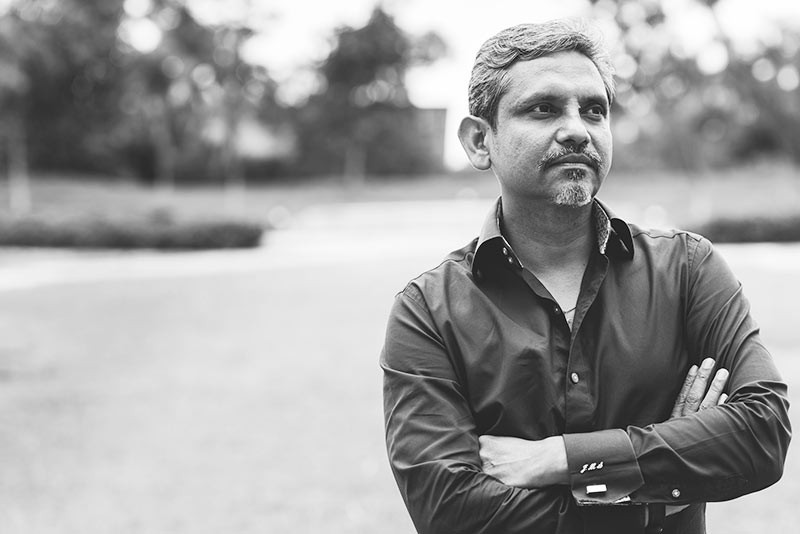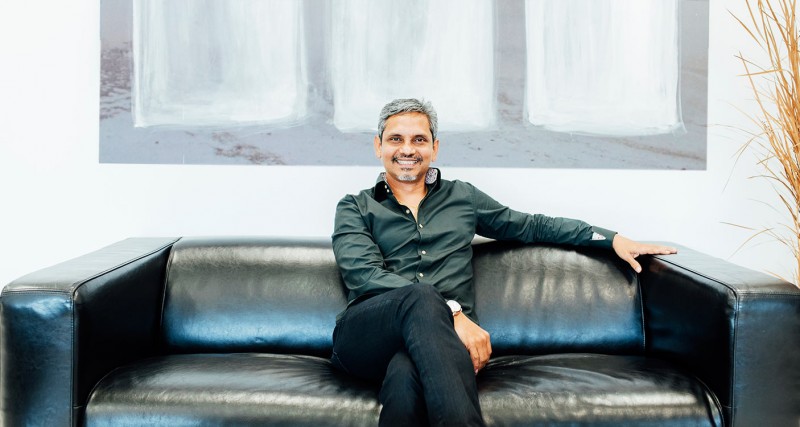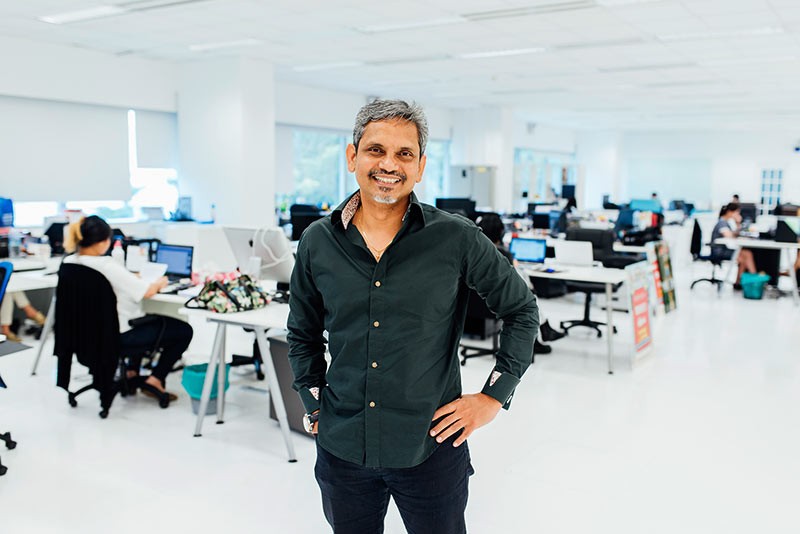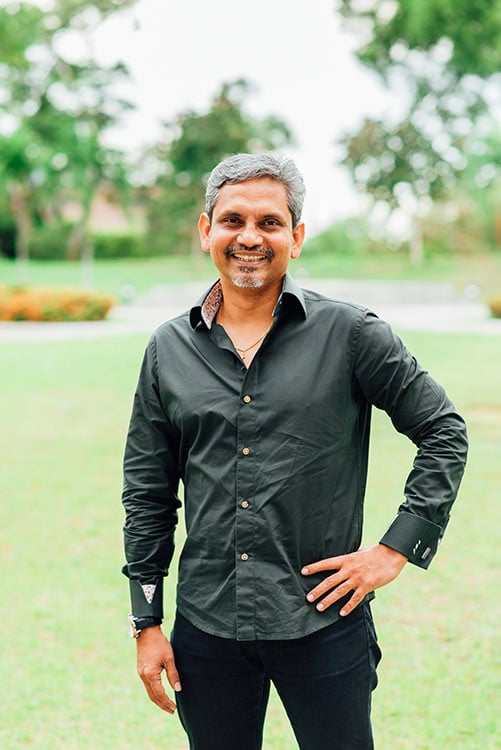Like the Construct in The Matrix, James Sundram’s office is white-washed on all sides. And like the Resistance, he is a bastion of defiance, airing his views unabatedly. The self-proclaimed ‘odd-ball’ says he has never ‘fit in’, and even as a younger man, he’d always challenged the wisdom of accepted practices and norms. At Singapore Press Holdings, where he spent two stints, first in 1989, and again in 2004, he says he warned of the impending collapse of newspaper classifieds, but the advice was not heeded. “They laughed at me,” he recalls. “I told them newspaper classifieds were going to be the first to die. People want information instantly, and not sift through listings for hours.” His iPhone rings and he excuses himself. It’s Thomas Zilliacus, YuuZoo’s co-founder and Chairman. James, who took over the reins in September 2015 after almost five years at PropertyGuru where he became Managing Director for International, is now leading the push for a new YuuZoo. “YuuZoo is a misunderstood company,” he says. “Many people, including investors don’t get us.” He wants to change all that. Founded in 2008, the firm builds social platforms for businesses with commerce, gaming, payments and digital cash capabilities, helping them engage and acquire new and loyal customers. It is evolving beyond its B2B roots into B2C platforms, and wants to go to big, untapped markets, recently partnering with gaming communities in China. James is also taking YuuZoo to Africa. “China will become increasingly expensive to acquire users because it's crowded. In Africa, I can be the big fish in a small pond, and I want to be there early.” YuuZoo made revenues of almost S$50 million in the last financial year. As a media veteran, he’s not optimistic about how large media organisations are managing their digital transitions. “The problem is, they move like elephants so it will take time.” He is also doubtful about the way acquisitions are managed, saying board or shareholder pressure typically drives such decisions, but without the right management in place to capitalise on the opportunity post-acquisition. “Are they genuinely building a digital business, or just trying to be sexy?” One of the guiding principles he lives by is to thy self be true. Most people, he says, live everyone else's lives except their own. “If you put something in your mouth, and don’t like it, just say you don’t like it.” His phone vibrates again. This time, he ignores it. “I drank a glass of Bordeaux Château lavie that cost two thousand dollars a bottle,” he continues. “I could not tell the difference between that and a thirty dollar bottle. Do you really think the sommelier can tell?” He is clearly both amused and contemptuous of how most people he says “follow the Joneses to Timbuktu”. “For two thousand dollars, it should be dancing in my mouth and blowing fire for God’s sake!” Next on his hit list: Foie Gras. “Come on, seriously, Foie Gras. . . really that great?” And Shark's fin – “tastes like plastic,” continuing his assault. Behind the pomp however, he reserves his biggest soft spots for his daughters, aged 22 and 21, who star on his phone’s wallpaper. “Every time I look at my phone – priceless,” he waxes as he shows me the picture. He wishes he’d spend more time with them when they were younger, which is his biggest regret. This probably taught him his second principle he tries to adhere to now, which is to live everyday like there’s no tomorrow. “If I could give a million dollars to just spend 20 minutes with them when they were rolling around, pulling my hair, kissing me, pulling my ear, jumping on me, and calling me daddy, I would do it, because and then we die.”
Conversations with James Sundram
YONG HUI YOW: Why is YuuZoo going to Africa?
JAMES SUNDRAM: China will become increasingly expensive to acquire users because it's crowded. In Africa, I can be the big fish in a small pond, and I want to be there early. I'm in the digital business so I need to be in big, untapped markets. Investors in Singapore don’t necessarily understand this. Unfortunately, I'm listed here. They say they don’t know what YuuZoo does. I say that’s because you are not my priority market. Africa ticks most of my boxes, but it could be Latin America too. S0uth China is an important market for us as well. We have also partnered with The Redeemed Christian Church of God [RCCG], one of the largest churches in the world in Africa.
YONG HUI: Will you consider listing somewhere else?
JAMES: I will consider that. Singapore is not my priority market; my market is global, and investors need to understand this. We need to be clear about the realities of where business is going. What took the Americans ten years to develop, took Singapore five years to implement, and the Chinese two years to copy. The timescales we are looking at now are vastly different from the past. Ford Motors is 150 years old, but Google is only 17 years old and its way bigger than all these hundred-year-old companies. I remember when I was at SPH, they were laughing at Google. They said it sounded like some children’s blabber; I kid you not. Even The New York Times laughed at Google. When Facebook was coming up, people made fun of Mark Zuckerberg too. Now look who is laughing.
YONG HUI: Newsweek also 'laughed' at the internet.
JAMES: Exactly. I'm not saying I'm right, but I'm going to give it a shot. I don’t want to go to crowded spaces because I don’t have the financial might, depth and local expertise. There is this parable: When I went to Timbuktu, I met a man with seven wives, each of the seven wives each had seven kids, each of the seven kids had seven dogs, each of the seven dogs had seven cats, and each of the seven cats had seven rats. How many people are going to Timbuktu? One! Just me! Chances are the guy I bumped into was getting out of Timbuktu, and brought his whole entourage. Now, everybody is going into China and India, but I want to go to places where the big guys are not yet established. You don’t need to be a rocket scientist to know that the Africans need more than anyone else because they are on a steeper upward curve. So are the Southern Chinese and Indonesians. My market entry is simple. I want to go in with local partners. More importantly, I try to partner someone who is desperate to survive.
YONG HUI: Who is desperate to survive?
JAMES: Big, traditional media companies. The television, radio and newspaper businesses are bleeding. Many years ago, I was at Singapore Press Holdings. Then I joined MPH Magazines for a short while, which became Blue Ink, which started Nuyou and Female Magazine. Subsequently, I spent nine years at Dow Jones, and then, I came back to SPH. This was around 2004, and I told SPH about the importance of digital and they laughed at me. They said: Aiya, young man, what do you know? I told them newspaper classifieds were going to be the first to die. People want information instantly. Nobody is going to sit down for two hours to sift through your listings to find maid services or which house to buy anymore. So when PropertyGuru came about a few years later, I decided to join them. They said I sounded like a person with a vengeance. I said: No, I just want to make life easier for people.
YONG HUI: Can traditional media companies successfully make the digital transition?
JAMES: They are finally seeing the light, and are trying to. The problem is, they move like elephants so it will take time. In the past, it was about the physical logistics to deliver your newspaper, warehousing, printing presses, satellites, stations – these are hard asset-based companies. To let go of that mindset and move into the digital frame requires a lot of change, and they are trying. Google's assets are data, technology, and brand – it’s difficult for a traditional media business executive to really understand the business of the first two. What is the average age of the board at SPH? Even I have more black hair than them. Look at the old man at the coffee shop. He knows smoking is bad and can give him cancer. He knows that, but he keeps on smoking. It's human nature. They need someone from the outside who understands digital businesses to come in. Some of these companies have come up with an investment company to build their digital business. Ultimately, they know it will compete with their traditional business, but these are the rare companies with smart lateral management who see this competition as ‘iron sharpens iron’. For every company that manages to do this, nine are heading full-steam for a brick wall, and they are accelerating towards it.
YONG HUI: Can they acquire their way in?
JAMES: Two wrongs don't make a right. Board or shareholder pressure usually drives these decisions just so they can say they are a digital and internet business. I recently asked a media executive in Singapore: I understand you bought over a [redacted] vertical. So why are your classifieds still in separate places? Why not combine your operations into one digital operation. But no! Effectively, all they have done is increase their sales force! And so they are just trying to compete with each other. Are they genuinely building a digital business, or just trying to be sexy? With the wrong management, it’s not going to work. They won’t know what to do with a digital asset. There is no turning back now.
A leader must always connect with the lowest common denominator. I’m rarely in this office. I do my best work when I’m out there with the guys.
YONG HUI: How did an ‘oddball’ become the CEO of a public company?
JAMES: Every couple of years, somebody gets lucky. [laughs] But let me define what I mean when I call myself an oddball. When I was younger, my principles were not readily accepted. People always told me to ‘Shut up lah, go away, you don’t know what you're talking about.” When I was in the army, during a SIT [situational] test, they asked me to choose between three paths – the easy, hard, or difficult one. I said: none, because if I was the enemy, I would booby trap every single of them! They said: No, you have to choose one. I said: No! I won’t! So they claimed I was not answering the question. The question does not even make sense, so I cannot answer. In the military context, if you see a road, it means someone has already walked down that path, and it will be booby-trapped. Anyhow, I went on to become a LERP commando. There was another incident a commander asked me why I was carrying my own signal set. I said if I was the enemy sniper with one bullet left, I would shoot the person without the signal set, because that's the brigade commander! I could not understand how they think just because they are Majors and Colonels, the lead bullet cannot touch them. You will be shocked these are the kinds of people who become managers in organisations, the people leading our society. You know how scary that is? People will judge you by your actions, not by what title you wear, and not what comes out of your mouth!
YONG HUI: The military seems to have influenced you a lot?
JAMES: In a way, it has. Now, many people use the word strategy, but don't understand what it means. Strategy has a very strong military connotation, devised by the military commanders and generals. It means actions to take which deliver an intended result, under conditions of uncertainty. In China, the first Emperor, Qin Shi Huang was trying to figure out how to keep the armoury’s swords sharp. One way is to get the soldiers to practise sword-fighting, and the swords would sharpen themselves, and in doing so, they also become better swordsmen. If they were good swordsmen, they are then better able to take down the enemy and win the war. This is where the term ‘iron sharpens iron’ came from. The general sparred with the rank-and-file soldier, and to me, that is leadership. A leader must always connect with the lowest common denominator. I’m rarely in this office. I do my best work when I’m out there with the guys.
We have a very undeserving society where many people in power don't know what they want, and as a result, they don’t know what they are doing – it's damn scary.
YONG HUI: Do you think the world is suffering from a leadership crisis?
JAMES: Yes, seriously. We have a very undeserving society where many people in power don't know what they want, and as a result, they don’t know what they are doing – it's damn scary. And not just a leadership crisis; today, we have become so socially-clustered. Oh, what school did you go to? What is your religion? Where do you stay? When you see someone with a beard, you start shivering in fear. It's a big issue. Are we really becoming a better world? I don’t classify my friends into races. If you close your eyes and see how some of my friends eat, you won’t be able to tell they are Chinese. I have friends who need their curry fixes three times a week. I played football with them because they were good defenders or strikers, not because they were Indian, or Chinese, or Malay.
YONG HUI: There is a video in which blindfolded girls were asked to grope and guess the race of the guys, and they got it wrong.
JAMES: [laughs] Yeah, you know there is a little song right? Bengali One So Long, Melayu One Sudah Potong, Indian One So Dark And Strong, Orang Puteh Just Like Sotong. But that's my point! Don’t cluster people.
YONG HUI: What is a B2C YuuZoo all about?
JAMES: YuuZoo started out in B2B, and the people here were very B2B-focused, but we are moving to B2C. In B2C, you need to simplify and get your user experience right. If you don’t understand your user and client experience, your business goes downhill. But we don’t want to be an ecommerce play. We are not Zalora or Ensogo. What we want to do is focus on demand-driven commerce. We want to know what you want to buy, and we do that by looking at your social interactions on our platforms. Games are one way we do that, where we let you engage with brands, get a discount or other prizes and eventually become a loyal customer. For example, let’s say, Singapore Airlines [SIA]. I might ask you to match where the new airbus A380 flies to. I give you three options: Melbourne, Kuala Lumpur, or Jakarta. Through this sort of brand engagement, the user starts a relationship with the brand, in exchange for discounts and other freebies. I can also create bespoke social commerce platforms for brands, and that's our B2B business.
YONG HUI: Why isn’t Facebook sufficient for brands?
JAMES: Companies like SIA pay a lot of money to communicate with their Facebook fans and advertise on Facebook. They may have two million people liking their page, but who owns the audience and data? Facebook. Not a bad deal for Facebook. SIA invests all this money to reach users on a platform it does not own. I offer the same service and the users are yours.
YONG HUI: Why is YuuZoo partnering with the gaming community?
JAMES: The gamers are the lowest-hanging fruits. There are 140,000 internet cafes in China, and I want this distribution network. If each of these cafes reaches 1,000 people, that’s 140 million people, which is a way bigger reach than any local-based business already. We have tied up with two different Ministries in China for Internet gaming events.
YONG HUI: Was that Garena’s strategy at the start?
JAMES: Yes, not far from that – a similar strategy. I'm building the distribution mechanism, and the gamers will become my resellers and distributors at the internet cafes. I will go where the money is, and right now, games are making a hell load of money. We have recently also partnered with Circle of Champions – a Swedish games company that makes basic games – for example, they make a football game where you can be Steven Gerald, and you can shop for boots that give you better power. Through this, you can stand to win a chance to compete for free tickets at Wembley, which to quote the Mastercard cliche: priceless. That’s what we are trying to do – gamified, social, demand-driven commerce.
YONG HUI: What is YuuPay all about?
JAMES: Payments are the future and mobile wallets are going to rock the world. YuuPay is our payments platform on which all our transactions rest. Out of every transaction, we get a cut. If you send money, we get a cut. You buy something, we get a cut. You sponsor something, we get a cut. We also have YuuCash, which is our digital money, which you can earn on our social commerce platforms. You can convert YuuCash into real life rewards. One of my favourite artists is Rolf Harris, who’s an Australian painter. What's interesting about him is that when he paints, you'll just see a lot of splashes. Then in the three or five seconds, he will connect a few dots, and you see a beautiful picture. I'm doing a Rolf Harris here. Disruption works like that. You may not see the full picture at first. When I was with Lonely Planet, I said that because of Skype, there will be less business travel. People were just comparing Skype with Telcos, but it's really about bringing people together. A lot of senior executives, even though they fly business or first-class, don’t like to travel. If they are able to not travel, they won’t. Skype created that opportunity.
YONG HUI: Virtual reality too will reduce the need for business travel.
JAMES: Yes. Disruption does not just affect one particular sector. It progressively disrupts its adjacent spaces. Uber is going to take money away from car sales eventually. I tell my wife: why do we need to replace our car? I got Uber, GrabTaxi, NTUC...
When you lose purpose in life, that's when you die.
YONG HUI: People like the status?
JAMES: That’s why I say we all work very hard to become successful, only to make stupid decisions. The car is not moving more than it is moving.
YONG HUI: And now you need a car park for it.
JAMES: Exactly! The cost of running my car can support two small families. Maintenance costs, parking, valets, coupons, ERPs, and road tax – not to mention the depreciation, enhancements, petrol. Then there are jams and the potential of accidents. Alas, in the end, my wife says she needs a car. When I was with PropertyGuru, I did not drive to work. I just took the train to Novena and it was a very short walk to the office. When I was younger, I've driven a Maserati, and you know how frustrating it was? I’m quite short so when I sit in the car, I cannot even see the road, and if I have to raise the seat, then what’s the point? I don’t get what’s the big thrill anymore. I've had enough of a rush when I was younger. I’m not going to do that when I'm 65 like a D.O.M [dirty old man] in a sports car. I really don’t need to drive a car at 200 km per hour and post on Facebook. My purpose now is to evangelise YuuZoo. I want to be out there achieving things and helping people. When you lose purpose in life, that's when you die. You don’t die when you stop breathing – that's when your body biologically stops functioning; you die when you lose your purpose.
YONG HUI: Why did you leave PropertyGuru?
JAMES: I have done whatever I can for PropertyGuru. At PropertyGuru, I drove a lot of the business. I spanned the markets, and set up and run different markets. If I continued staying, I’ll just be an expensive leech, and I'm not cheap. YuuZoo started to talk to me some time ago. I’m lucky that I'm very local, but at the same time, I have a lot of international experience. Thomas was interested to get me onboard, so we talked.
YONG HUI: What do you regret most?
JAMES: I regret building my career when my kids were growing up. They are now 22 and 21. Every time I look at my phone: priceless. If I could give a million dollars to just spend 20 minutes with them when they were rolling around, pulling my hair, kissing me, pulling my ear, jumping on me, and calling me daddy – because my friend, and then we die. Who is the 39th president of the United States, do you know? My point is, who gives a damn. If you can’t remember the 39th president of the United States, who is going to remember James? You need to prioritise, and you cannot please everybody. There is a song by Rick Nielsen called Garden Party, and the lyrics go: You see, ya can't please everyone, so ya got to please yourself. It's not about being selfish, but understanding what works for you.





